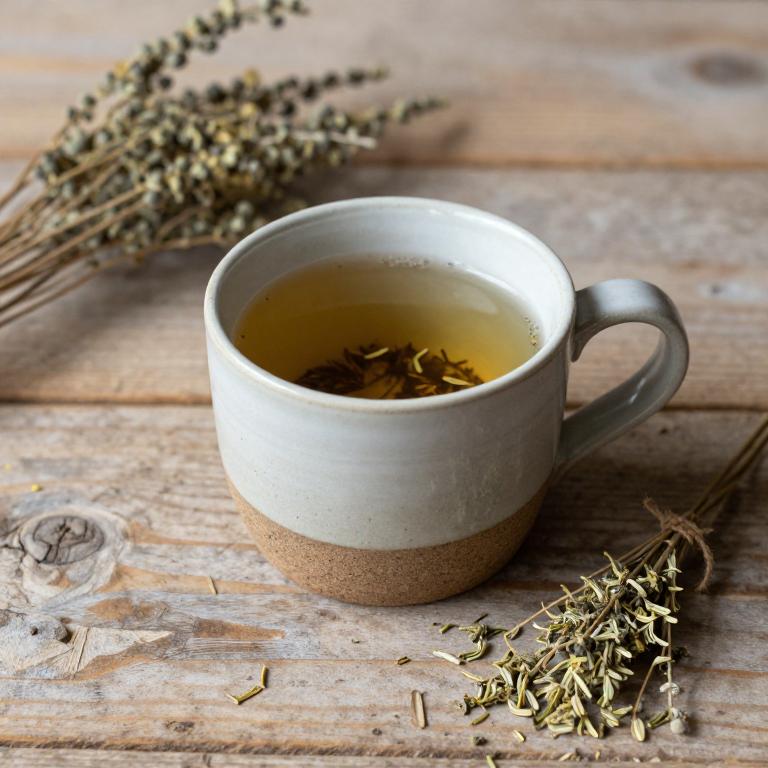10 Best Herbal Teas For Gum Swelling

Herbal teas can be a natural and effective remedy for gum swelling due to their anti-inflammatory and antimicrobial properties.
Teas made from ingredients like chamomile, green tea, and licorice root are commonly used to soothe inflamed gums and reduce bacterial growth. These teas work by promoting healing and reducing irritation, making them a gentle alternative to chemical-based treatments. To use, simply steep the herbs in hot water and allow it to cool before applying it to the gums with a clean cloth or using it as a mouth rinse.
Regular consumption of these herbal teas can help maintain oral health and prevent recurring gum issues.
Table of Contents
- 1. Salvia (Salvia officinalis)
- 2. Stinging nettle (Urtica dioica)
- 3. St. john's wort (Hypericum perforatum)
- 4. Rosemary (Rosmarinus officinalis)
- 5. Oregano (Origanum vulgare)
- 6. Echinacea (Echinacea purpurea)
- 7. Aloe vera (Aloe barbadensis)
- 8. German chamomile (Chamomilla recutita)
- 9. Thyme (Thymus vulgaris)
- 10. Ceylon cinnamon (Cinnamomum zeylanicum)
1. Salvia (Salvia officinalis)

Salvia officinalis, commonly known as sage, has been traditionally used in herbal teas to address various health issues, including gum swelling.
The anti-inflammatory and astringent properties of sage leaves help reduce inflammation and soothe irritated gums, making it a natural remedy for periodontal problems. When brewed into a tea, sage can help alleviate symptoms such as redness, tenderness, and swelling associated with gingivitis or other gum infections. Its high concentration of antioxidants and antimicrobial compounds may also support overall oral health by inhibiting the growth of harmful bacteria.
Regular consumption of sage tea, combined with good dental hygiene, may contribute to the prevention and management of gum-related conditions.
2. Stinging nettle (Urtica dioica)

Urtica dioica, commonly known as stinging nettle, has been traditionally used in herbal remedies for its anti-inflammatory and astringent properties.
When brewed into a tea, it may help reduce gum swelling by soothing inflamed tissues and promoting healing. The tea contains compounds like silica and antioxidants that support oral health and reduce bacterial growth. It is often recommended as a natural alternative to commercial mouthwashes for those seeking gentle gum care.
However, it is important to consult a healthcare professional before using stinging nettle tea, especially if you have existing health conditions or are taking medications.
3. St. john's wort (Hypericum perforatum)

Hypericum perforatum, commonly known as St. John's Wort, is a herbal plant that has been traditionally used for its therapeutic properties.
While it is well-known for its antidepressant effects, it also possesses anti-inflammatory and antimicrobial properties that may benefit oral health. When brewed into a tea, hypericum perforatum can help reduce gum swelling by soothing inflamed tissues and inhibiting the growth of harmful bacteria in the mouth. However, it is important to note that it should not be used as a substitute for professional dental care.
Individuals considering using this herb should consult with a healthcare provider, especially if they are taking other medications, as it can interact with certain drugs.
4. Rosemary (Rosmarinus officinalis)

Rosmarinus officinalis, commonly known as rosemary, is a herbal plant widely used in traditional medicine for its various health benefits.
Rosemary herbal tea has been traditionally used to alleviate gum swelling due to its anti-inflammatory and antimicrobial properties. The essential oils in rosemary, such as cineole and camphor, help reduce inflammation and promote healing in the gums. Drinking rosemary tea regularly may help prevent and reduce gum irritation and swelling by supporting oral health.
However, it is advisable to consult with a healthcare professional before using rosemary tea, especially for individuals with existing medical conditions or those taking medications.
5. Oregano (Origanum vulgare)

Origanum vulgare, commonly known as oregano, is a popular herb used in herbal teas for its anti-inflammatory and antimicrobial properties.
When brewed into a tea, oregano can help reduce gum swelling by soothing inflamed tissues and combating oral bacteria that contribute to gum disease. The essential oils in oregano, such as carvacrol and thymol, are known for their strong antibacterial effects, which may prevent plaque buildup and promote gum health. Regular consumption of oregano tea may support overall oral hygiene and reduce the risk of gingivitis.
However, it is advisable to consult a healthcare professional before using oregano tea, especially for those with allergies or existing health conditions.
6. Echinacea (Echinacea purpurea)

Echinacea purpurea, commonly known as purple coneflower, is a popular herbal remedy often used to support immune health.
While it is widely recognized for its potential to reduce the duration and severity of colds, some studies suggest it may also have anti-inflammatory properties that could help alleviate gum swelling. When brewed into a tea, echinacea may help soothe inflamed gums by reducing bacterial growth and promoting healing. However, it is important to note that echinacea should not replace professional dental care, especially for severe or persistent gum issues.
As with any herbal remedy, it is advisable to consult with a healthcare provider before incorporating echinacea into a regimen for gum health.
7. Aloe vera (Aloe barbadensis)

Aloe barbadensis, commonly known as aloe vera, has been widely used in herbal teas for its soothing and anti-inflammatory properties.
When brewed into a tea, aloe vera can help reduce gum swelling by calming irritated tissues and promoting healing. The natural compounds in aloe vera, such as polysaccharides and antioxidants, work to strengthen the gums and improve oral health. While it is generally safe for most people, it is important to use aloe vera tea in moderation and consult a healthcare professional if you have existing medical conditions.
Overall, aloe barbadensis herbal tea can be a beneficial addition to a natural oral care routine for those experiencing gum swelling.
8. German chamomile (Chamomilla recutita)

Chamomilla recutita, commonly known as German chamomile, is a popular herbal remedy often used in the form of tea to address gum swelling and inflammation.
Its anti-inflammatory and antiseptic properties help reduce redness, swelling, and irritation in the gums, making it a natural alternative to conventional treatments. When consumed as a warm tea, chamomile can soothe the mouth and promote healing by calming the oral tissues. It is also frequently used in mouth rinses to provide additional relief from gingivitis and other gum-related issues.
However, individuals with allergies to ragweed or related plants should exercise caution when using chamomile, as it may trigger adverse reactions.
9. Thyme (Thymus vulgaris)

Thymus vulgaris, commonly known as thyme, is a popular herb used in herbal teas for its antimicrobial and anti-inflammatory properties.
When brewed into a tea, thyme can help reduce gum swelling by fighting the bacteria that contribute to gum inflammation. The essential oils in thyme, such as thymol, have been shown to support oral health and promote healing in the gums. Regular consumption of thyme herbal tea may also help freshen breath and reduce the risk of dental infections.
However, it is advisable to consult a healthcare professional before using thyme tea as a treatment for gum issues, especially if you have underlying health conditions or are taking medications.
10. Ceylon cinnamon (Cinnamomum zeylanicum)

Cinnamomum zeylanicum, commonly known as cinnamon, is often used in herbal teas to address gum swelling due to its anti-inflammatory and antimicrobial properties.
The essential oils in cinnamon, particularly cinnamaldehyde, help reduce inflammation and prevent bacterial growth that can lead to gum issues. When brewed into a tea, cinnamon can soothe irritated gums and promote overall oral health. To prepare the tea, a teaspoon of cinnamon powder or a few cinnamon sticks can be steeped in hot water for several minutes.
While cinnamon tea is generally safe, it should be consumed in moderation to avoid potential irritation of the mucous membranes.